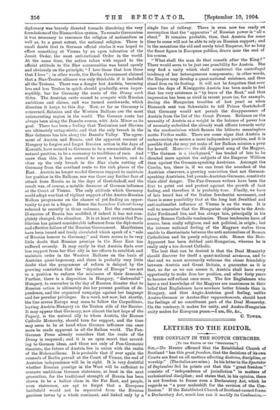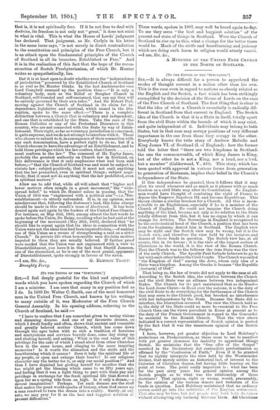LETTERS TO THE EDITOR.
THE CONFLICT IN THE SCOTCH CHURCHES.
LTO TILE EDITOR OF THE "SPECTATOR."
SIE,-Dr. Hunter affirmed that the Established Church of Scotland "has this great freedom., that the decisions of its own Courts are final on all matters affecting doctrine, discipline, or worship." (The italics are mine.) In his letter in the Spectator of September 3rd he points out that this "great freedom" consists of "independence of jurisdiction" in matters of ecclesiastical discipline ; and states that, in his opinion, there is not freedom to frame even a Declaratory Act, which he regards as "a poor makeshift for the revision of the Con- fession." If the Established Church of Scotland cannot frame a Declaratory Act, much less can it modify its Confession,— that is, it is not spiritually free. If it be not free to deal with doctrine, its freedom is not only not "great," it does not exist in what is vital. This is what the House of Lords' judgment has declared. That judgment, as Mr. Carlyle in his letter in the same issue says, "is not merely in direct contradiction to the constitution and principles of the Free Church, but it is an attack upon the fundamental principles of the Church of Scotland in all its branches, Established or Free." And it is in the realisation of this fact that the hope of the recon- struction of Scotch Presbyterianism, of which Dr. Hunter writes so sympathetically, lies.
But it is at least open to doubt whether even the "independence of jurisdiction" possessed by the Established Church of Scotland is as real as Dr. Hunter thinks. In the last Auchterarder case Lord Campbell summed up the position thus :—" It is only a voluntary body, such as the Relief or Burgher Church in Scotland, self-founded and self-sustained, that can say they will be entirely governed by their own rules." And Sir Robert Peel, moving against the Church of Scotland in its claim for in- dependence, legislative and spiritual, which issued in the Dis- ruption, spoke to the same effect :—"There is a complete distinction between a Church that is voluntary and independent, and one that is established by the State. Take the case of the Roman Catholics or any of the Protestant Dissenters in this country, who are not connected with the State by way of Estab- lishment. Their right, so far as voluntary jurisdiction is concerned, is quite supreme, and we do not attempt to interfere with it. Those who choose to submit to it, in consequence of their connection with any such denomination, have a perfect right to do so; but if a Church chooses to have the advantage of an Establishment, and to hold those privileges which the law confers, that Church must conform to the law." The comment of Mr. Taylor lanes, probably the greatest authority on Church law in Scotland, on this deliverance is that it only emphasises what had been said before,—" that the Church of Scotland was and must be subject to statute law; subject positively, that it must not omit anything that the law prescribed, even in spiritual things ; subject nega- tively, that it must not do anything that the law prohibited, even in spiritual matters."
Allow me to add that, while all will admit that "higher and lower motives often mingle in a great movement," the "wide- spread belief," to which Dr. Hunter refers in passing, that the Union of 1900 was "engineered with a political aim "—i.e.,"Dis- establishment—is utterly unfounded. It is, in my opinion, most mischievous that, following the Scotsman's lead, this false charge should be made in this month's issue of Blackwood. It has been denied again and again by the leaders of the United Free Church. For instance, on May 31st, 1900, among almost the last words he spoke before the Union, Dr. Rainy, recalling what he had said at the beginning of the movement (May 28th, 1895), declared that "he should like to repeat again that his ideas in connection with the Union were not the ideas that had been imputed to him,—of making use of this Union as a means of strengthening a raid on a sister Church." In private life when honourable men disclaim motives imputed to them they are usually believed. If further proof were needed that the Union was not engineered with a view to Disestablishment, you have it in the fact that Sheriff Jameson, one of the staunchest, as he is one of the most genial, opponents of Disestablishment, spoke strongly in favour of the union.
Broughty Ferry.



































 Previous page
Previous page